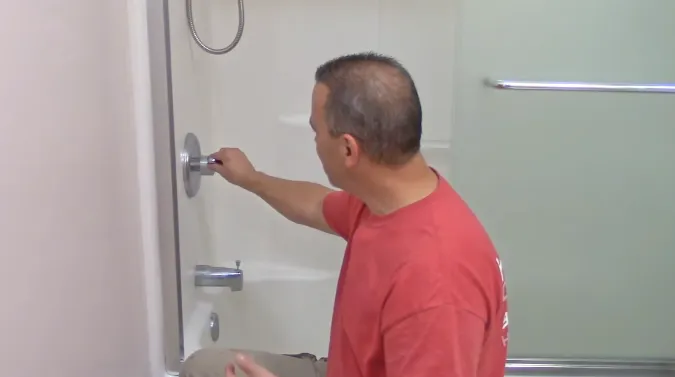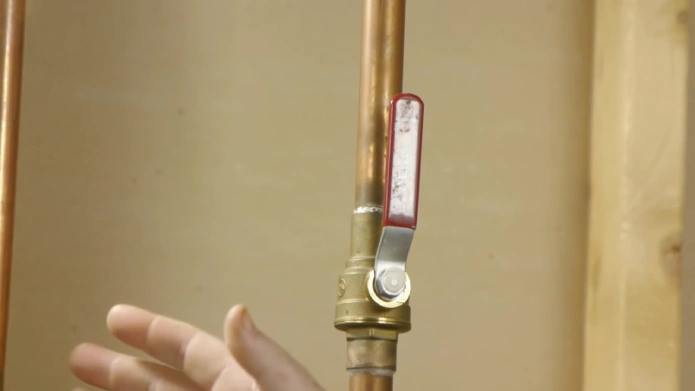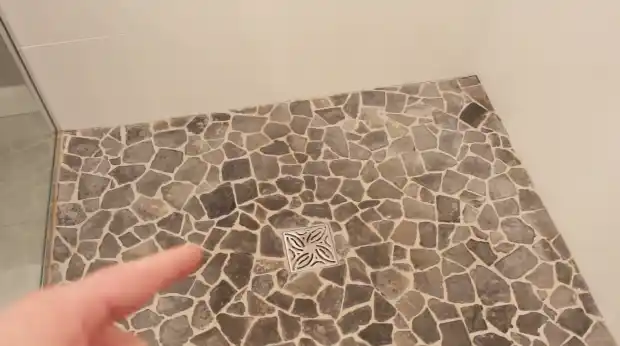Last Updated on May 18, 2023
Are you tired of the distracting noise from your shower or bathroom mixing valve? This noise is both annoying and can also be a sign of bigger problems with your plumbing system.
Mixing valves blend hot and cold water to provide the desired temperature for showers, sinks, bathtubs, and other fixtures. Loose components, worn-out parts, blockages in the valve, high water pressure, and many others are responsible for noisy mixing valves.
To solve the noise issue generated by mixing valves, diagnose the cause by identifying the source, examining the valve, checking water pressure levels, inspecting pipes, testing the thermostatic elements, and exploring the electrical components.
Why Is My Mixing Valve Making Noise: 5 Reasons

Find out why mixing valves make noise and how to quiet them down so your plumbing system runs smoothly.
01. Mechanical Issues
Loose components
Over time, components in a mixing valve can become loose and create noise. This is often caused by wear and tear, vibration, or incorrect installation.
Worn-out parts
Worn-out parts of the mixing valve can cause noise, as well as leaks, reduced water pressure, and decreased performance.
Blockages in the valve
Blockages in a mixing valve can precipitate noise as well as can also prevent the valve from functioning properly. This can occur when foreign objects get stuck in the valve or when the valve becomes clogged with mineral buildup.
High water pressure
High water pressure can put a strain on the mixing valve and cause it to make a noise. If the water pressure is too high, it can also cause leaks, reduce water pressure, and damage other components in the system.
02. Air in the pipes
Air trapped in pipes
Air can become trapped in pipes, creating noise and reducing water pressure. This can occur when pipes are installed incorrectly or when air vents are blocked.
Improper installation or venting
Improper installation or venting can lead to air turning trapped in pipes, leading to noise and decreased water pressure.
Blocked air vents
Blocked air vents can cause air to become trapped in pipes, causing clamor and reduced water pressure.
Insufficient air elimination
Insufficient air elimination can lead to air becoming trapped in pipes and creating noise. This can be caused by incorrect installation, clogged air vents, or a malfunctioning air eliminator.
03. Mineral Buildup

Hard water deposits
Hard water deposits can accumulate in pipes and valves over time, causing noise, reduced water pressure, and reduced efficiency.
Scaling in pipes and valves
Scaling in pipes and valves can cause noise, a decrease in water pressure, and decreased performance.
Impacts on valve performance
Mineral buildup can have a significant impact on the behavior of a mixing valve, causing noise and reducing water pressure.
Importance of regular maintenance
Regular maintenance, having flushing and descaling, can help prevent mineral buildup and ensure proper operation of a mixing valve.
04. Thermostatic Issues
Malfunctioning thermostatic elements
A malfunctioning thermostatic element may precipitate a mixing valve to make noise and also prevent it from regulating temperature properly.
Calibration problems
Calibration problems with a mixing valve’s thermostatic element can result in inconsistent temperature control and noise.
Worn-out thermostatic cartridges
Worn-out thermostatic cartridges can cause noise and reduce performance in a mixing valve.
Inconsistent temperature control
Inconsistent temperature control can result from thermostatic issues and cause a mixing valve to make a noise.
05. Electrical Problems
Short circuits
Short circuits in the electrical system of a mixing valve can lead to noise and reduce its performance.
Wiring issues
Wiring issues can cause turbulence and undermine the operation of a mixing valve.
Defective motors or solenoids
Defective motors or solenoids emit noise and diminish the functionality of a mixing valve.
Power surges
Power surges can cause noise and damage to the electrical components of a mixing valve.
How To Solve The Issue Of Noise Generated By Mixing Valves?

Mixing valves are an essential component in a plumbing system that helps regulate water temperature by mixing hot and cold water to a desired temperature.
Mixing valves serve the important purpose of ensuring a comfortable and safe water supply by preventing the water from reaching harmful temperatures.
Noise in mixing valves can be caused by various aspects, including mechanical issues, pipe turbulence, mineral buildup, thermostatic issues, and electrical problems.
01. Steps to diagnose the cause of noise
Identifying the source of the noise
The first step in solving noise issues generated by mixing valves is to identify the source of the noise. This can be done by listening carefully to the location and type of noise.
Examining the valve for loose components
Examine the valve for loose components, such as bolts or screws, which can cause noise if not tightened properly.
Checking for blockages in the valve
Inspect the valve for blockages, which can generate noise and reduce performance.
Testing water pressure levels
Test the water pressure levels to ensure they are within the recommended range, as the high water pressure can cause noise in mixing valves.
Inspecting the pipes for air
Inspect the pipes for air, which can cause noise if it is trapped in the system.
Checking for mineral buildup
Check for mineral buildup, such as hard water deposits, which can cause noise and reduce the performance of the mixing valve.
Testing the thermostatic elements
Test the thermostatic elements for accuracy to make certain they are functioning properly and accurately controlling the water temperature.
Examining the electrical components
Examine the electrical components, such as motors, solenoids, and wiring, to ensure they are functioning properly and not causing the noise.
02. Solutions for Common Causes of Noise

Loose components
Tighten any loose components, such as screws or bolts, to resolve noise caused by loose parts.
Worn-out parts
Replace any worn-out parts, such as gaskets or O-rings, to resolve noise caused by worn-out components.
Blockages in the valve
Remove any blockages in the valve to eliminate noise caused by these issues.
High water pressure
Reduce the water pressure to the recommended range to resolve noise caused by high water pressure.
Air in the pipes
Eliminate air from the pipes by installing proper vents and ensuring that the pipes are properly installed and vented.
Mineral buildup
Remove mineral buildup by cleaning and descaling the pipes and valves regularly.
Malfunctioning thermostatic elements
Replace any malfunctioning thermostatic elements to resolve noise caused by these issues.
Electrical Problems
Resolve electrical problems, for example, short circuits or wiring issues, by seeking professional help or replacing defective components.
03. Preventative maintenance tips
To prevent noise in your mixing valve, perform regular maintenance and upkeep on your system. Here are some tips to keep your mixing valve running smoothly and quietly:
Regular cleaning and descaling of pipes and valves
Over time, hard water deposits and mineral buildup can cause scaling in pipes and valves, leading to performance issues and noise. Regular cleaning and descaling of your system protects your system from developing.
Proper installation and venting of pipes
Improper installation or venting of pipes can lead to air being trapped in the system, which can cause noise. Ensure that your pipes are installed and vented correctly to prevent air from building up.
Regular testing of thermostatic elements
Thermostatic elements are components of mixing valves and can malfunction over time. Regular testing of these elements can help identify and prevent problems before they cause noise.
Regular inspection of electrical components
Electrical problems such as short circuits, wiring issues, and power surges can cause noise in your mixing valve. Regular inspection of these components can help prevent these problems from occurring.
Proper use and maintenance of the mixing valve
Proper use and maintenance of your mixing valve can help ensure it runs smoothly and quietly. Follow the manufacturer’s instructions for the use and care of your mixing valve to ensure optimal performance.
Can a Mixing Valve Make Noise After Getting Clogged?

A clogged mixing valve can cause loud noises. This is due to the buildup of water pressure in the pipes that becomes so great it creates a vibration noise.
If you notice any loud rattling or banging noises coming from your pipes, it could be a sign that your mixing valve is clogged and needs to be addressed.
How can You Tell If Your Mix Valve is Broken?
A broken mixing valve can cause further issues, such as low hot water pressure, the inconsistent flow of hot and cold water, or even complete loss of hot water.
These symptoms may indicate that your mixing valve is not functioning properly and may need to be replaced.
You should also look for signs of corrosion or sediment buildup around the valves which may indicate an issue with the mixing valve itself.
Does a Broken Mixing Valve Create Noise?
A broken mixing valve can create loud rumbling noises due to the high-pressure levels in the pipes caused by a lack of flow regulation.
Potential sound disturbances coupled with other symptoms could point to an underlying issue with either your mixer valves or the installation itself.
Should I Replace My Mixing Valve If It Creates Noise?
It depends on what type of noise you hear, as some noises can be normal while others may require immediate action.
Trust the professionals to keep your system running safely and smoothly. They’ll inspect the mixer valves, diagnose any issues, then repair or replace them as needed.
Keep Your Mixer Valves Running Quietly
Mixing valves are essential components in any plumbing system, and they can be noisy if not taken care of properly. Knowing why your mixer valve is making noise and being able to address the issue quickly will help preserve your plumbing system while ensuring that you do not deal with a noisy house for too long.
Common solutions for reducing or eliminating noises created by mixing valves include checking for air leaks, cleaning sediment out of the pipes, replacing worn-out parts, and installing dampening materials like rubber gaskets. With some diligent maintenance and timely repairs, you should be able to keep your mixer valves running smoothly with minimal disturbance from loud noises.



